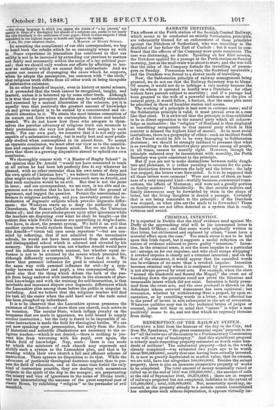SABBATH IMPIETIES.
THR officers at the Perth station of the Scottish Central Railway, which seems to be conducted on strictly Sabbatarian principles, are vehemently blamed for an enforcement of those principles against the Dutchess of Sutherland, who was travelling to the deathbed of her father the Earl of Carlisle : but it must be con- fessed that the officers of the Company were quite consistent. The case was distressing, no doubt. Speeding on her filial mission, the Dutchess applied for a passage at the Perth station on Sunday morning, just as the mail-train was about to start; and she was told that the rules of the Company forbade the travelling of passen- gers on Sunday. Persuasion was vain, the Secretary inexorable ; and the Dutchess was forced to a slower mode of travelling.
Now, the Sabbatarian principle of railway management being granted, we do not see that the Railway Secretary was to blame. Of course, it would not do to infringe a rule merely because the lady on whom it operated so hardly was a Dutchess ; for other, women have parents subject to mortality ; and if a passage had been granted to the wife of a powerful nobleman on the plea of natural piety, it would follow, a fortiori, that the same plea must be admitted in those of humbler station and means.
The working of a principle is best seen in extreme cases ; and if the Sabbatarian principle is valid, it must prevail even in a case like that cited. It is awkward that the principle is thus exhibited to be in direct opposition to the natural piety which all acknow- ledge as instinctive : the "religion" of Scotland is thus displayed as something antagonistic to that natural piety which in this country is deemed the highest kind of morals. As in most social institutions, there is a geography of ethics : such an incident South of the Tweed would be felt to be very damaging to Sabbatarian doctrines ; we should be strongly inclined to presume that what is so revolting to the instinctive piety prevalent among all people, in all times, cannot be morally right. However? though the principle enforced may be inconsistent with morality, the Perth Secretary was quite consistent to the principle.
But if you are not to make distinctions between noble daugh- ters and plebeians, it is rather puzzling to account for the pecu- liar-distinction drawn between the lady and the letters : the lady was stopped, the letters were forwarded. Is it to be supposed that all those letters were sermons? Were not most of them on busi- ness of a very temporal kind—worldly business, commercial trans- actions, the affairs of Mammon ; and were not a goodly portion on family matters? *Undoubtedly. So that secular matters and family intercourse may be forwarded by train in the shape of letter, but the living daughter is denied a passage. Certainly i that s not being consistent to the principle : if the Dutchess was stopped, on what plea are the mails to be forwarded? These inconsistencies are not often detected in a system that is really virtuous and sound.


























 Previous page
Previous page